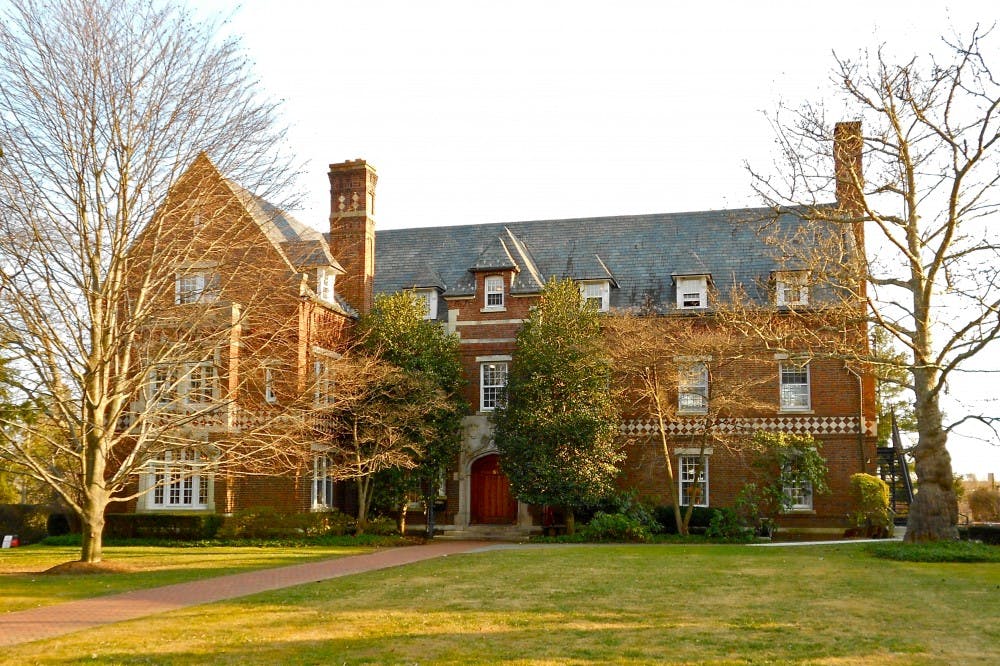In a newly-announced change to financial aid policy at Cap and Gown Club, all members on University financial aid will now receive a grant for club membership, and members on full financial aid will pay “no out-of-pocket costs.” Previously, the Cap financial aid policy was based on a yearly application process.
The change comes after a Dec. 9 meeting of the club’s Board of Trustees, which voted unanimously to approve the new policy.
“Cap and Gown membership has become continuously more diverse as the demographic profile of the University has itself grown more diverse, and we are very glad that the club provides a welcome and inclusive atmosphere for all students,” Board Chair Tom Fleming ’69 wrote in a statement on the club’s website. “Our new financial aid policy has resulted from the leadership of our officers and young alumni board members, who have been champions of ensuring that any student is able to join the club.”
For students on financial aid, the grant will cover the difference between Princeton’s upperclass board rate of $9,250 and Cap and Gown’s member charges, which amounted to $9,470 for the 2019–20 academic year.
Additionally, students not on University financial aid who receive “external sources of aid” will be “similarly eligible for a Cap and Gown financial aid grant.”
“I’m delighted that Cap has taken this step and appreciate the work of the Graduate board and the generosity of alumni,” Cap president Karthik Ramesh ’21 wrote to The Daily Princetonian. “When I announced our new policy to members, I was very cognizant of and grateful for past officer corps whose dedication and initiative paved the way for this moment.”
According to the club’s announcement, the new policy was partially funded by the classes of 2020 and 2021, who donated “a large share” of their spring 2020 board rebates. In the future, financial aid at Cap will be funded by donations from “the Cap and Gown community.”
“I hope our new policy eases the financial strain that eating club membership may cause and look forward to welcoming a diverse class of sophomores in the Spring,” Ramesh added.

The rest of Prospect Ave.
The University’s 11 eating clubs offer various financial aid policies, with a summary of fees and aid available at the eating clubs’ website.
Many of the clubs offer financial assistance on a case-by-case basis. These clubs generally include Charter Club, Cloister Inn, Colonial Club, Cottage Club, Ivy Club, Tiger Inn, Terrace Club, and Tower Club. Several mention requiring applications, while others speak in more vague terms about offering aid to those who need financial assistance.

Notably, Bicker club Cannon Dial Elm does not list a financial aid policy on its website. But Cannon president David Hoffman ’22 told The Daily Princetonian in an email that the club plans to roll out a financial aid program next fall.
“We are happy and excited to be rolling out a new program and are hoping that with it we can open Cannon up to an even broader array of students,” Hoffman wrote. He indicated, however, that further details are not yet available.
Quadrangle Club, a sign-in, offers one of the lower fees on the Street, with its most recent public information stating a fee of between $9,060 for students on full aid and $9,360 for students who receive no aid. Quad president Krystal Delnoce ’22 spoke positively of Cap’s new policy in an email to the ‘Prince’ and emphasized the value of inclusivity.
“Any time a place becomes more inclusive and accessible is always a great thing that should be celebrated!” she wrote. “Quad is a leader in this aspect and other clubs also following suit only shows that the Street is becoming more aware of the changing demographics on Princeton’s campus.”
“All clubs still have more work to do in order to become more inclusive,” Delnoce added. “Quad has committed and will continue to commit to be accessible for all of those interested — from sophomore dues to full membership dues.”
Ivy and Cottage both run member scholarship programs, with Ivy offering grants through its Ivy 1879 Foundation and Cottage distributing funds through its “Glinka Scholarship Fund.” While Ivy’s policy states that every member on financial aid is eligible for a grant covering the net price of club membership above the University’s upperclass board allocation, Cottage’s policy does not make this guarantee, relying on an application process.
Annual fees for the 11 clubs ranged from $8,900 to $10,450 in the 2019–20 academic year. As the Street was closed for the fall semester and will remain closed for spring 2021, no clubs will charge dues for the 2020–21 academic year.
Virtual Bicker and Street Week will take place from Jan. 31 to Feb. 13, 2021.








